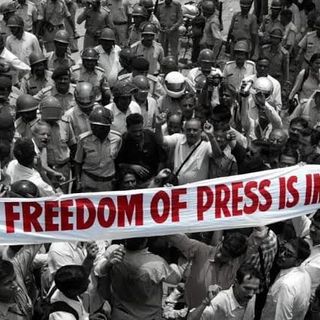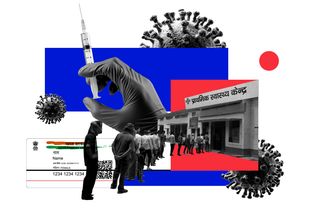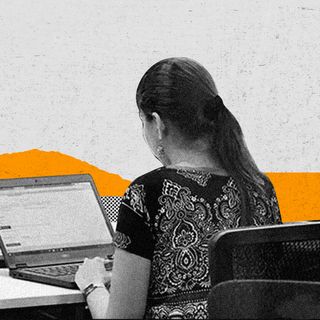
Effective Covid Vaccine Will Be Meaningless in India Without a Mass Immunization Strategy
“We should have started [planning] last month,” said retired bureaucrat and public health expert PV Ramesh.

Alarmed by expansive election-time promises of free immunization against Covid-19 and discussions of digital registration and tracking methods long before a safe and efficacious vaccine is ready, public health experts in India are calling for a comprehensive nationwide vaccine strategy and for preparatory works to be undertaken urgently. The cost and delivery back-end of a vaccine are meaningless, they say, if the logistics of a vaccination program are not in place.
While a national task force under the Niti Aayog is studying strategies for vaccine distribution, state-wise plans and decentralized surveys that will be required to assess infrastructure gaps are still to get underway.
“We should have started last month,” said retired bureaucrat and public health expert PV Ramesh, who says a good plan for immunizing Indians against the SARS-CoV-2 virus must include a nationwide policy alongside state-wise strategies and local micro-mapping of priority groups.
Three vaccine candidates are currently in various stages of clinical trials in India. But despite hopes for a final breakthrough early next year, experts foresee extensive challenges in planning and executing stage-wise distribution of a vaccine. As a billion-plus citizenry awaits immunization, any such program will involve an unprecedented scale of operations — even conducted over two years, millions of doses will have to be administered daily by a rickety public health infrastructure.
Among the thorny issues still to be ironed out are assessing priority groups who will receive the vaccine first, training an adequate number of healthcare workers to administer it correctly, expeditiously adding infrastructure capacity for safe storage, and ensuring a continued supply of ancillary medical items that will be required for a multi-year immunization campaign, from Personal Protective Equipment (PPE) to syringes and more.
“This has to be a granular exercise rather than an omnibus prescription. We will require village-specific, town-specific mapping even if broad principles are laid down nationally,” Ramesh said. He added that in rural areas, for example, using the Primary Health Center (PHC) as the main unit of planning, surveys must identify those most vulnerable or exposed to the virus including health-workers and frontline workers. Active members of the workforce who contribute to economic growth, as well as teacher-student clusters will also require proper categorization, he said.
For now, the national task force is still discussing how to categorize priority recipients for the first stage when demand will have to be managed to meet limited supply.
Related on The Swaddle:
117 Million+ Children May Miss Immunization Due to Covid19 Lockdown
In his latest address to the nation, Prime Minister Narendra Modi said the Government of India is preparing a strategy on delivering the vaccine as soon as possible to “every Indian.” Meanwhile, the Bharatiya Janata Party also made a free vaccine part of its election manifesto in the northern state of Bihar, where a first round of polling is complete. In the southern state of Tamil Nadu, also poll-bound next year, leaders have similarly promised a free vaccine.
Public and private stakeholders seem focused on the Aadhaar system as a possible digital back-end for vaccine registration and for tracking and certification of those vaccinated, but experts anticipate a situation where the most vulnerable and/or most deserving candidates for the vaccine are left behind on account of not having Aadhaar.
But the discussions surrounding a digital back-end to oversee the delivery of a Covid-19 vaccine are surprising when the ground-level delivery mechanism for a vaccine remains crippled, said Dr. Amar Jesani, an independent consultant in bioethics and also editor of the Indian Journal of Medical Ethics. Talk of a ‘digital back-end’ in the absence of robust ground-level public health systems, he said, is designed to excite the Indian middle-classes seeking a digital ‘vaccination passport’ to travel.
“We will need strong primary health centers, sub-centers, and trained health workers. This is where urgent investment is required,” he said. He pointed to the need to urgently increase manufacturing capacity to produce medical ancillary items that will be required, including needles, syringes, cotton-swabs, PPE kits, etc. Nearly a billion units of some items would be required for a two-dose vaccine if even half of India’s population is to be immunized through 2021 and 2022.
An army of health functionaries will require training — the Covid-19 vaccine could be an injectible, and incorrect administering could pose health concerns. States such as Uttar Pradesh, Bihar, and Rajasthan are also likely to face human resource shortages, which may emerge only when micro-plans are drawn up.
Additionally, “the vaccine may require ultra-cold storage systems. We should assess how many PHCs don’t have refrigeration systems,” Dr. Jesani added.
At present, India’s Universal Immunisation Programme, the world’s largest infant immunization scheme, utilizes cold chain facilities at about 28,000 locations, a capacity that will require augmentation. A subgroup of the national expert committee is studying how cold chain systems will have to be buttressed.
The Government of India has also said that the UNDP-supported electronic Vaccine Intelligent Network or e-VIN could be leveraged for the Covid-19 vaccine distribution, with its inherent capacity to use a digitized cold chain and supply chain management. But the e-VIN program has not been rolled out in all states. Upscaling the e-VIN program was already underway before the pandemic. Officials said digitization of vaccine stocks for real-time monitoring and capacity-building for states’ public health staff are ongoing efforts, but the program was designed to be completed only by December 2022.
India’s role is seen as central to the success of the World Health Organisation-led initiative COVAX (Covid-Vaccine Access), a global vaccine allocation initiative that will place orders for mass-production of top vaccine candidates and ensure equitable allocation. But despite its success at infant immunization, India has scant expertise in adult vaccination, in contrast to the United States or European nations where the influenza vaccine is a routine adult immunization program. This poses fears that ramping up the cold chain infrastructure owned by the Universal Immunisation Programme will impact ongoing infant immunization rounds.
“I believe this cycle has already been interrupted during the lockdown, and this is the most dangerous thing that could happen,” Ramesh said.
Kavitha Iyer is an independent journalist based in Mumbai.
Related


Globally, Women’s Workforce Participation Has Not Increased in 25 Years: UN Report
